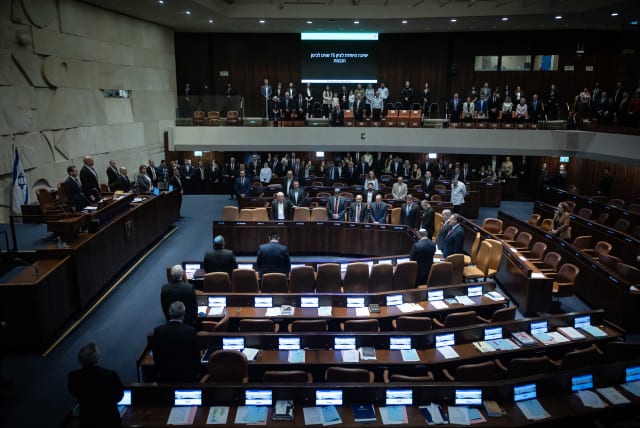Knesset to hold marathon session to approve 2024 budget

Opposition party Yesh Atid filed a no-confidence motion on Monday over the government's failure to close what finance ministry officials said were unnecessary ministries.
The Knesset will begin a 25-hour long debate on Tuesday over the government’s renewed 2024 budget, and vote on it on Wednesday afternoon, the Knesset House Committee announced on Monday.
The committee enacted a special parliamentary procedure in order to limit the opposition’s ability to filibuster the vote, due to its criticism of both the budget’s content and its legislative procedure.
Finance Minister Bezalel Smotrich addressed the budget in his weekly press conference ahead of his Religious Zionist Party meeting, saying that he “expected the opposition to understand the enormity of the moment and not oppose a responsible, adapted budget, which supports the war effort. A vote against the budget is a vote against the war and the civilian resilience,” Smotrich said.
Unnecessary ministries and wasted funds
Opposition part Yesh Atid filed a no-confidence motion on Monday over the government’s failure to close what finance ministry officials said were unnecessary ministries, and its decision not to remove from the budget funding of sectorial demands, such as for haredi Torah study academies (yeshivot), or to settlements.
Party chairman MK Yair Lapid presented the motion. “You do not ask, “Where does the money come from,” because you do not care about them [the working middle class],” Lapid said. “They do not interest you. From your perspective, they – the Israeli middle class – has only one purpose – so that you have someone to extort, and live at their expense,” he said.
The opposition leader also criticized the government’s decision to raise Israel’s Value Added Tax (VAT) from 17%$ to 18% beginning in 2025.
“This cannot go on. You will go home and there will be a better government here who cares about Israel’s citizens, respects working people, and asks where the money comes from before spending it,” Lapid said.
Assuming the budget passes on Wednesday, the government will have overcome a significant hurdle and will need to deal with the next hurdle – the need for more soldiers to fight in Israel’s war against Hamas, and the haredi (ultra-Orthodox) political leader’s refusal to support enlisting haredi men, who currently enjoy a blanket exemption.
Smotrich in his press conference addressed this issue as well, and argued that Religious Zionism has repeatedly proven itself “in the beit midrash [Torah study hall], at the [war] front, and on the home front.” Smotrich described this as “mutual respect and taking responsibility in all planes of action in the State of Israel, out of a deep connection to Torah.”
“This model can and must expand. The haredi public is ready for it, and we need to initiate change,” Smotrich said.
The public debate over the haredi exemption from IDF service broke out after the government last month announced its plan to extend mandatory and reserve duties for current soldiers to fill the ranks left vacant by the many soldiers killed and injured in action, as well as to meet Israel’s heightened security needs. The government did not propose to meet these needs by recruiting soldiers from a broader pool of candidates, such as haredim, to lessen the burden on those who already are serving.
The public debate also coincided with a court case against the haredi exemption that is currently underway in Israel’s Supreme Court. The previous law that enabled haredi exemption officially expired at the end of June 2023, and the government decided that it would pass a new law by the end of March 2024. However, with that date nearing, the government does not seem close to solving the issue. Government funding for yeshiva students also stems from the law that expired, and thus if no solution is found by the end of March, haredi men may no longer be legally entitled to an exemption, and yeshivot may lose their funding.
Jerusalem Post Store
`; document.getElementById("linkPremium").innerHTML = cont; var divWithLink = document.getElementById("premium-link"); if (divWithLink !== null && divWithLink !== 'undefined') { divWithLink.style.border = "solid 1px #cb0f3e"; divWithLink.style.textAlign = "center"; divWithLink.style.marginBottom = "15px"; divWithLink.style.marginTop = "15px"; divWithLink.style.width = "100%"; divWithLink.style.backgroundColor = "#122952"; divWithLink.style.color = "#ffffff"; divWithLink.style.lineHeight = "1.5"; } } (function (v, i) { });

